The East Asia and Pacific Summer Institutes (EAPSI) in Japan is a program organized by the National Science Foundation that provides U.S. graduate students in science and engineering with first-hand research experience in Japan, an introduction to the science and science policy infrastructure of Japan, and orientation to the Japanese culture and language. The primary goals of the program are to introduce students to Japanese science and engineering in the context of a research laboratory and to initiate personal relationships that will better enable them to collaborate with their foreign counterparts in the future. Below, four American graduate students who participated in EAPSI in the summer of 2011 describe their research and cultural experiences in Japan.
Mel Hainey
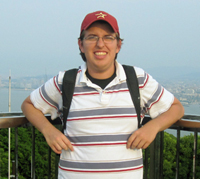
Mel Hainey
One of the main focuses of my research at Penn State University is the growth of silicon thin films on glass and quartz. These films have great potential for electronics or solar cell applications, but research has shown that directly depositing silicon on quartz leads to poor quality thin films. Subsequently, indirect methods of silicon thin film formation have been developed, including the method I study, known as aluminum induced crystallization (AIC).
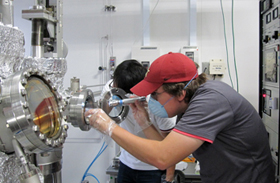
Mel working in the lab in Japan.
In applying for the NSF EAPSI program, I hoped to find a host professor with whom I could not only attempt a research project, but also learn enough about AIC to continue experiments back at Penn State. Fortunately, both Dr. Taizoh Sadoh of Kyushu University and Dr. Noritaka Usami of Tohoku University were experts on AIC and willing hosts for me. Additionally, both professors had recently published papers that would form the foundation for my EAPSI summer project.
Living in Japan definitely required some adjustments on my part. I was helped immensely by Robert Whiting’s series of books on Japanese baseball: The “Chrysanthemum and the Bat,” “You Gotta Have Wa,” and “The Samurai Way of Baseball.” These books chronicle the ups and downs of both Americans playing in Japan and Japanese playing in the U.S. They served as an excellent guideline for what to expect in Japan.
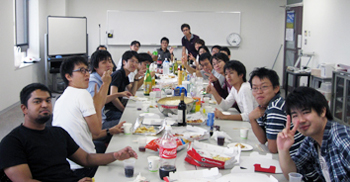
Taking a break with lab mates in Japan.
Over and over, the most successful players are the ones who show patience, flexibility, and a willingness to accommodate their hosts. While personal adjustments were important, nothing influenced my experience in Japan as much as my hosts. I owe not only Dr. Sadoh and Dr. Usami, but also all of their students and staff, so many thanks for their aid and their accommodation throughout my time in Japan.
As an American graduate student, I realize my perspective may be limited, but I also believe that more can be done to encourage greater mutual exchange and collaboration between American and Japanese researchers. While I think that many resources are available for American graduate students to travel to Japan, I think it would be equally valuable for Japanese graduate students to perform research in the U.S., and I would encourage students to seek out opportunities. The chance to perform research in a different cultural setting allows one to gain a different perspective on the entire process. I think that performing research in Japan has made me a better researcher, and I think that performing research in the U.S. would prove equally beneficial for Japanese students.
Phuong Bui
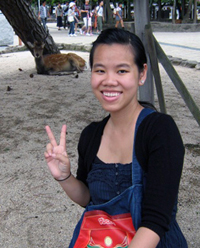
Phuong Bui
Japan has been a special inspiration throughout my life. When I was little, I learned to read with translated Japanese comic books (manga). The Japanese style of drawing attracted my interest and provided motivation to learn the words the characters were speaking. As an adult, “cool” Japanese gadgets held my fascination; there always seems to be something new coming from Japan. Going to Japan has been a lifelong dream for me to see the Japanese culture in person. Growing up in a developing country, I experienced the direct adverse impact of human on nature and the environment, and developed a passion for environmental issues.
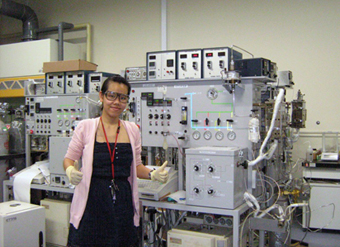
In the lab at the University of Tokyo.
My chosen graduate research project is in the field of renewable energy, specifically biomass oil. We investigate catalysts that assist in upgrading biomass-derived oil into commercialized gasoline. Our project is being conducted in conjunction with universities worldwide such as the University of Tokyo, Japan, and the University of Malaga, Spain. Through this connection, I came to know of Dr. Oyama, who is a professor at the University of Tokyo. He is among the leading researchers in the application of spectroscopic techniques for the study of catalysts, which is also an area of interest to me.
As soon as I heard about the summer program, I decided to apply for Dr. Oyama’s laboratory. The NSF EAPSI/JSPS summer program gave me an exceptional opportunity to experience research in the country I have great respect and admiration for.
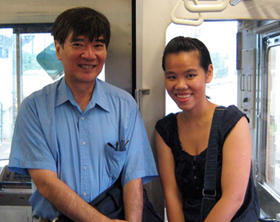
Phong with her host researcher, Dr. Oyama.
Both Japan and the United States are leading nations in science and technology. Successful cooperation between the two countries leads to valuable contributions to the world’s knowledge. Subsidized language programs integrated with exchange programs would create an effective initial step in the development of young students’ and scholars’ curiosity and interest in new cultures and working methods.
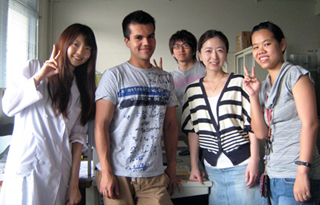
Phong with her colleagues in Japan.
Joint infrastructure, such as online databases in both languages, can provide an easy-to-access place for scientists and engineers to share knowledge. Sister university programs in which universities from one country pair up with ones from the other country can bring many opportunities to young students to make friends and access university resources (such as research labs) from both sides.
Terry Ferret
The goal of wireless communications research is to improve the energy efficiency and speed of wireless communication devices, such as cell phones and laptop computers. For example, improved energy efficiency extends the battery life of cellular telephones, allowing users to talk, text, and download data for longer periods of time without recharging.
Physical layer network coding is a technique which relaxes this constraint by allowing two simultaneous transmissions, reducing the time required for data exchange, and improving the transfer speed of the network by as much as 50 percent. The goal of my research is to refine physical layer network coding under practical operating assumptions.
My experience at the wireless communication laboratory in Yokohama National University was overwhelmingly positive. The students were enthusiastic in welcoming me, and showed great interest in conversing with a native English speaker. As research presentations in my field are often given in English, I helped several students improve their presentation ability, a task which I deeply enjoyed. My host professor made useful suggestions which allowed me to complete my research tasks in the allotted time of the program. I also had the opportunity to have fun, and my lab mates introduced me to salsa dancing, the Tokyo nightlife, and playing basketball in the University gymnasium!
I feel that a program which sends a group of Japanese students to perform research or study in the United States would provide a wonderful opportunity for Japanese students to experience the same cultural differences as I did.
Andrew Kae
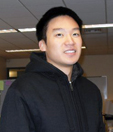
Andrew Kae
Much of our collective knowledge is still stored in books and other printed media. As more of this printed media becomes digitized and available online, it is increasingly important to accurately recognize the text in these images in order to allow better search and organization. My work focuses on the problem of accurately recognizing machine printed text in a scanned image of a book or newspaper, generally referred to as optical character recognition or OCR.
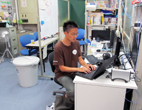
In the lab at Osaka Prefecture University.
I had a highly positive experience doing research and living in Japan. I enjoyed discussing ideas with Professor Kise, Professor Iwamura, and their graduate students, getting valuable feedback on my work. I also joined an international student group at my host institution and got to know many foreign students from many countries including France, Korea, and Australia. In addition, I got to know many of the other fellows and learned about work outside my own research area.
In terms of cultural activities, I am very thankful to JSPS (Japan Society for the Promotion of Science) for arranging my home stay during the orientation in Japan. I really enjoyed spending time with my host family and getting to know about everyday life in Japan. I also had an interest in learning the Japanese language, so I took advantage of some tutoring that was offered at my host institution.
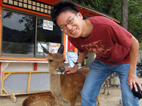
Andrew on his travels around Japan.







COMMENTS0
LEAVE A COMMENT
TOP